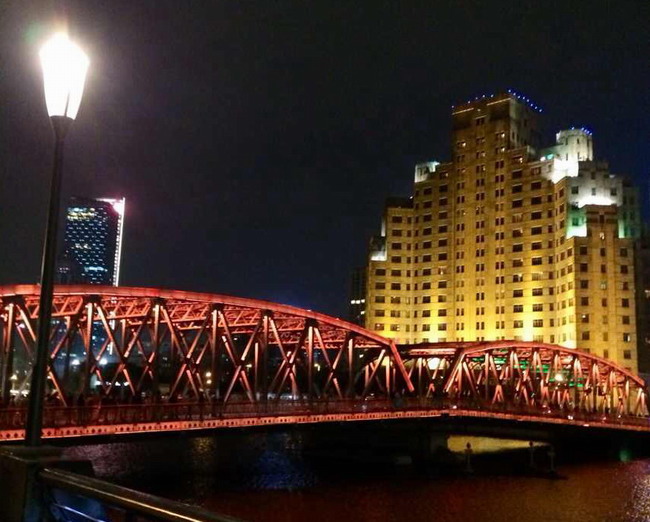Waibaidu Bridge resonates with century-long romance
By Yang Chunya (chinadaily.com.cn) Updated: 2015-04-30 10:40
 |
|
Night view of the Waibaidu Bridge in Shanghai.[photo by Yang Chunya] |
Against a backdrop of a sunset-mottled sky, 30-something Du Yuesheng is taking a walk with his girlfriend over Waibaidu Bridge(外白渡桥). The 19-year-old girl, who will later become one of Du’s wives, asks him: “May I be your woman?” The young man is struck, but says nothing, instead staring at the glistening Suzhou Creek beneath the conduit.
That was a scene from The Last Tycoon, one of many movies that generate heady nostalgia for Shanghai, the boom city in the Far East during the 1920s and ’30s.
The anecdote about Du Yuesheng (1888-1951), one of the four “tycoons” in old Shanghai, has since associated Waibaidu Bridge (known in English as Garden Bridge) with romance. Perched at the point where Suzhou Creek meets the Huangpu River, Shanghai’s mother river, the 107-year-old bridge has become a popular hang-out for couples. And local young girls share a common dream of saying “I do” to their Mir Rights there.
“We usually offer our customers three options of shooting places in Puxi (the west area to the Huangpu River), and Waibaidu Bridge is the first of the choices” said Zhao Lin, who runs Yvone Studio catering to those wishing to take outdoor pre-wedding photographs in Shanghai. “The bridge is best viewed at night, or just as the sun is setting, when its lattice of metal trusses is illuminated”.
Waibaidu Bridge fascinates people most with its unique design and intriguing history, as it has witnessed joy and sorrow for more than a century.
It was said that part of Suzhou Creek could only be crossed by ferry before 1856. Boats between Huangpu District and the old Jewish quarter of Hongkou District were crowded and unsafe, so a British businessman, Charles Wills, commissioned the Soochow Creek Bridge Company to build a wooden viaduct.
 |
|
A couple pose for a photo on the Waibaidu Bridge in Shanghai.[photo by Yang Chunya] |
The wooden bridge wore away quickly and the Cleveland Bridge Company, a UK concern which had designed a dozen major bridges around the world, began construction of a new steel bridge. It opened in 1908 and remains the one in service today.
The technical name for the style of Waibaidu Bridge is “camelback truss”, which describes two low arches that support the roadway. The abutments and pier were made with Portland cement and it has granite cornerstones.
Adjacent to The Bund in central Shanghai, it has always been busy. According to a 1926 survey, 50,823 people, 14,600 rickshaws, 4,999 cars, 172 buses and 922 trams passed over the bridge between 7am and 7pm on May 17-18. Today, it serves around 3 million vehicles per day.
The bridge has also witnessed some frightening moments. A typhoon on July 27, 1915 killed a person walking across by dashing him to the ground and blowing several people into the Huangpu River.
Later that year, the city’s top military officer, Zheng Rucheng, was assassinated by two revolutionaries while his car was driving across the bridge to attend a ceremony at the Japanese Consulate. There were also reports that Chinese had to show respect to Japanese guards while crossing the bridge after the Japanese invasion in the 1930s.
Yet still the construction survives. On 15 February 1994 the Shanghai Municipal Government declared Waibaidu Bridge an example of Heritage Architecture and one of the outstanding structures in Shanghai. It remains a popular attraction and one of the few constants in the ever-changing metropolis’ skyline.











